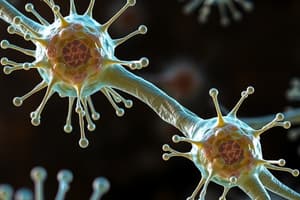Podcast
Questions and Answers
Which type of receptor allows a flow of ions across the plasma membrane, changing the membrane potential and producing an electrical current?
Which type of receptor allows a flow of ions across the plasma membrane, changing the membrane potential and producing an electrical current?
- G-protein–coupled receptors
- Ligand-gated receptors
- Ion-channel–coupled receptors (correct)
- Enzyme-coupled receptors
What do G-protein–coupled receptors activate in the plasma membrane, initiating a cascade of effects?
What do G-protein–coupled receptors activate in the plasma membrane, initiating a cascade of effects?
- Trimeric GTP-binding proteins (correct)
- Enzymes
- Ion channels
- Ligands
What do enzyme-coupled receptors act as or associate with when stimulated?
What do enzyme-coupled receptors act as or associate with when stimulated?
- Ligands
- Enzymes (correct)
- G proteins
- Ions
What is a ligand defined as within biochemistry?
What is a ligand defined as within biochemistry?
What type of proteins do enzyme-coupled receptors display their ligand-binding domains on?
What type of proteins do enzyme-coupled receptors display their ligand-binding domains on?
Flashcards are hidden until you start studying
Study Notes
Ion Channels and Receptors
- Ion channel receptors allow a flow of ions across the plasma membrane, changing the membrane potential and producing an electrical current.
- Ion channel receptors are responsible for generating electrical signals in neurons.
G-Protein-Coupled Receptors
- G-protein–coupled receptors activate G-proteins in the plasma membrane, initiating a cascade of effects.
- G-protein–coupled receptors trigger a series of signaling events that ultimately lead to a response.
Enzyme-Coupled Receptors
- Enzyme-coupled receptors act as or associate with enzymes when stimulated.
- Enzyme-coupled receptors display their ligand-binding domains on the surface of transmembrane proteins.
Ligands and Receptors
- A ligand is defined as a molecule that binds to a receptor, triggering a response.
- Ligands are molecules that bind to receptors, initiating a biological response.
Transmembrane Proteins
- Enzyme-coupled receptors display their ligand-binding domains on transmembrane proteins.
- Transmembrane proteins are proteins that span the plasma membrane, allowing for interaction between the extracellular and intracellular environments.
Studying That Suits You
Use AI to generate personalized quizzes and flashcards to suit your learning preferences.




